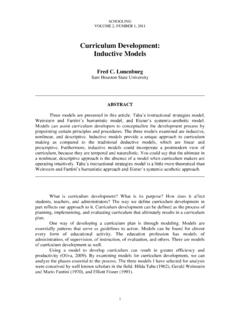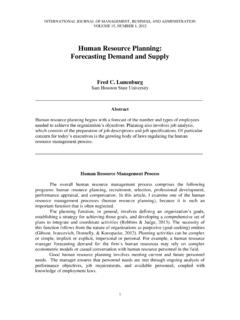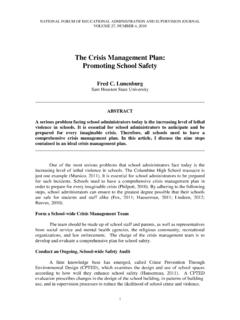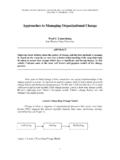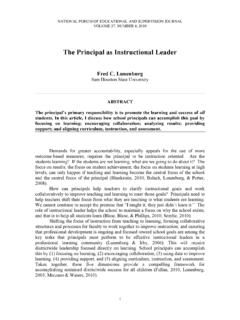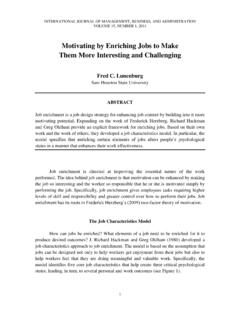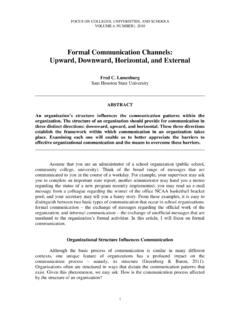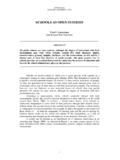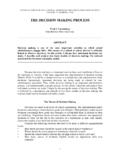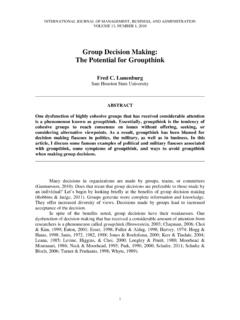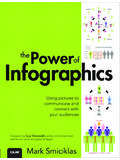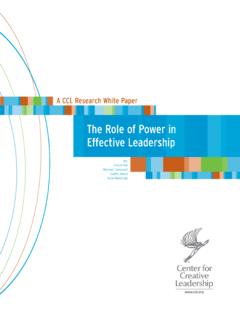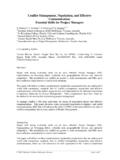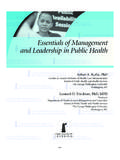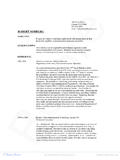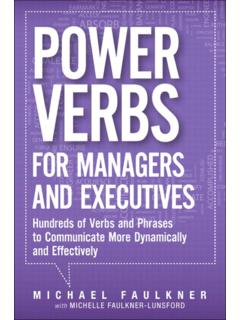Transcription of Leadership And The Effective Use Of Power Harold …
1 Leadership And The Effective Use Of Power Harold E. Fuqua, Jr. Western Kentucky University Kay E. Payne Western Kentucky University Joseph P. Cangemi Western Kentucky University Abstract This article defines Power , focuses on sources and types of Power , how leaders can increase their Power , and how Effective leaders use Power without hurting the organization and its members. Leaders who work to increase their personal Power , persuasiveness, and expertise will enhance their effectiveness. If they exercise authority over others with sensitivity, avoid dominating or threatening them, and rely on their expertise and personality to influence them, leaders can enhance their effectiveness. Effective leaders do not display the characteristics associated with an abrasive personality which would cause them to under-utilize the talents of employees.
2 Effective leaders increase their personal Power by empowering others in the organization. Power interests people involved in romantic relationships, as well as in workplace organizations. Many people spend entire lifetimes attempting to acquire Power in the workplace, while others seek positions of authority (which will not be the subject of this article) in order to control people, resources, and information. Some people desire Power in order to gain large sums of money to purchase expensive homes, cars, and memberships in country clubs; or to travel, going first class; or to visit exotic places around the world. Employees in many organizations seek decision-making Power , or Power to gain the ear of their superiors over issues that affect their daily work lives. This article defines Power , focuses on the sources and types of Power , how leaders can increase their Power , and how Effective leaders use Power without hurting the organization and its members.
3 Power Defined Relative to organizations, Cangemi (1992) asserted: " Power is the individual s capacity to move others, to entice others, to persuade and encourage others to attain specific goals or to engage in specific behavior; it is the capacity to influence and motivate others" (p. 499) Krausz (1986) argued " Power is the ability to influence the actions of others, individuals or groups. It is understood as the leader s influence potential" (p. 69). Verderber and Verderber (1992) argued, "Social Power is a potential for changing attitudes, beliefs, and behaviors of others" (p. 280). Weber (1954) defined Power as "the possibility of imposing one s will upon the behavior of others," while Etzioni (1978) wrote, " Power is an actor s ability to induce or influence another actor to carry out his directives or any other norms he supports.
4 " Those in Power have the ability and capacity to get others to do what they want them to do. Folger, Poole, and Stutman (1993) defined Power as "the capacity to act effectively" (p. 69). These definitions of Power focus on the successful way leaders influence their followers to produce an effect. Cangemi (1992) believed successful leaders move and influence people through their Power toward greater accomplishments for themselves and their organizations. Tannenbaum (1962) believed Effective leaders have the ability, through interpersonal influence, to cause their subordinates to attain specific personal, as well as organizational goals. Hersey and Blanchard (1982) suggested Effective Leadership acts as the process of influencing the activities of an individual or group in efforts toward goal achievement in a given situation.
5 Sources and Types of Power The currency of Leadership , essential to influencing others, involves a wide variety of factors. Varying authors (Baldridge, 1971; French & Raven, 1959; Hackman & Johnson, 1991; Kanter, 1977; King, 1987) described sources, types, and uses of Power essential to Effective Leadership . Eight primary sources of Power include: support systems, information, credibility, visibility, legitimacy, persuasiveness, charisma, and agenda setting. Support systems include both formal and informal opportunities for networking. Information, the second source of Power , involves not what one knows, but how fast one finds out, which encourages Power players to be good listeners. Power flows to those who have the information and know-how to accomplish organizational tasks. The third Power source, credibility, resides in how much respect one attains.
6 We rely on highly credible people who have established a history of experience and expertise. The fourth source of Power , visibility, means taking on tough jobs so people take notice. Legitimacy, the fifth source of Power , works in concert with visibility and involves having respected Power players commend one publicly, thereby creating acceptance among any would be doubters. The sixth source of Power , persuasiveness, determines how successfully a person uses rational or emotional appeals. One s ability to persuade depends on personality, content of a task, motivation, and confidence. The seventh source of Power , charisma, incorporates many other ethical qualities of Leadership together. Charisma includes a leader s reputation, sincerity, trustworthiness, expertise, and dynamism. Describing this artistic proof of Leadership by saying it involves a leader s aura, the emanations of his or her spirit, the amount of "psychic space" taken up, helps explain it.
7 The last source of Power , agenda setting, rests in knowing when meetings will be held and accessing the group leader to put items on the agenda at just the right time. Two by-products of networks and alliances involve access to decision-making arenas and the ability to influence the agendas in those arenas. People or groups who have access to agenda setting frequently represent their positions, while the interests and concerns of those not present may become distorted or ignored (Brown, 1986; Lukes, 1974). While operating in a system, knowing how to identify Power makes it easier to access the type which works best. The five most commonly known types of Power include: coercive, reward, legitimate, expert, and referent (French & Raven, 1959). Coercive Power bases its effectiveness on the ability to administer punishment or give negative reinforcements.
8 The second type, reward Power , rests on the ability to deliver something valued by the receiver. People who can deliver money, jobs, or political support have something other people want, and therefore become extremely powerful in organizations. Legitimate Power , the third type, resides in a person s position rather than the actual person himself or herself. This type of formal Power relies on position in an authority hierarchy. Occasionally, people with legitimate Power fail to recognize they have it, and then they may begin to notice others going around them to accomplish their goals. The fourth type, expert Power , relies on a person s special knowledge and expertise in a given area. Anyone can have it if he or she formally and informally prepares sufficiently. The last type, referent Power , includes admiration of a leader, which usually produces influence and acceptance by subordinates (French & Raven, 1959).
9 Referent Power acts a little like role model Power . It depends on respecting, liking, and holding another individual in high esteem. It usually develops over a long period of time. Among these five sources of Power , creating a positive operating climate involves choosing the most appropriate compliance-gaining tactics, which tend to lead to greater "life" or job satisfaction (Plax, Kearney, & Downs, 1986). McCroskey, Richmond, Plax, and Kearney (1985) claimed relying on expert, reward and referent Power appeared to produce the greatest satisfaction, while reliance on coercive and legitimate Power had the opposite effect. Rahim (1989) found legitimate Power useful in gaining compliance, but satisfaction from supervisees decreased. Expert and referent Power bases correlated with both compliance and satisfaction.
10 Rahim (1989) also noted Effective leaders can "enhance their referent Power base if they learn to be considerate of their subordinates needs and feelings, treat them fairly, and defend their interests when acting as their representative" (p. 555). Effective leaders combine the various bases and sources of Power , electing to use them in appropriate situations. An Effective leader rarely depends on only one source or base of Power . Effective Leaders Become More Powerful To increase organizational Power , Effective leaders recognize the importance of developing their own personal Power . Kotter (1977) asserted the importance of planning, organizing, budgeting, staffing, controlling, and evaluating the people on whom the leader depends. Trying to control others solely by directing them on the basis of authority associated with one s position rarely works.
